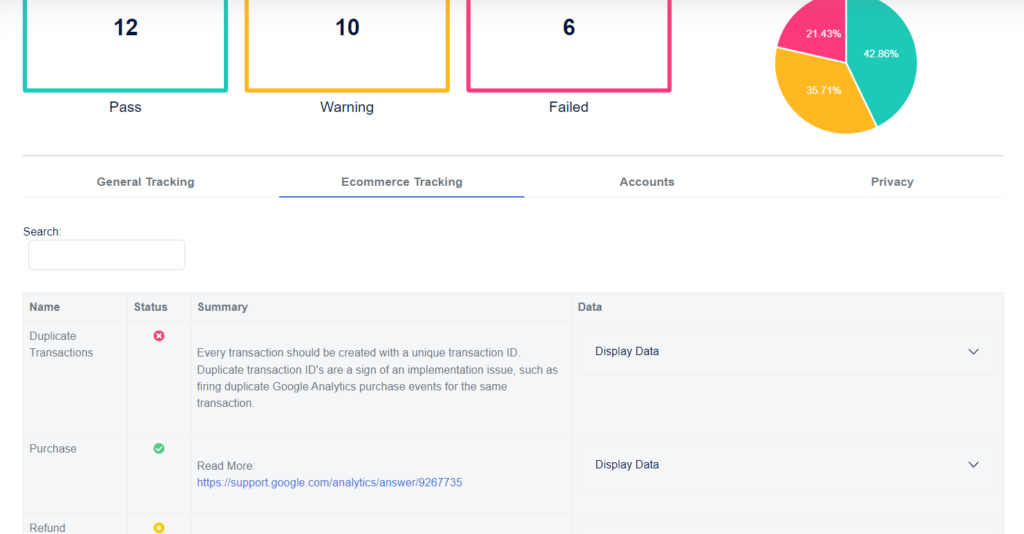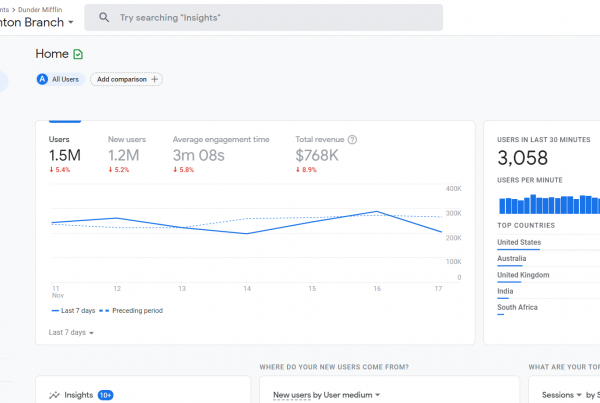
What Is Web Analytics?
To comprehend how users behave on the internet, we measure the data with web analytics. Web analytics will track user activity on your websites in various categories.
You can retrieve a lot of useful information through analytics platforms. They track how users found your website, the number of pages visited, the total number of visitors to your site, and how long users stay on your site. There are many other aspects of user behavior that you can decipher through analytics, and they can be beneficial to your small business strategy.
Companies can use this data to rate the performance of their website, as well as track conversion rates and product purchases. They can then use these web analytics to assess what’s not working in their current web presence and tweak it accordingly.
How Does It Work?
The majority of web analytics platforms will require you to add a piece of code into the coding of your website. This code will allow your website to tag each page to keep a record of users.
The coding tag will integrate with the web analytics platform to track pretty much all visitor activities. Every time they visit your pages or click any links, there’s a record. Beyond their activity, this tool can also capture which device they are using, browser, operating system, and their IP address, which will let you know their approximate location.
The platforms use cookies as a way to tell users apart and recognize them when they return to your site. That said, if the users clear out their cookies or return to the site on a different web browser, then it won’t recognize them as the same user. Web analytics will then understand them as a completely new user and start a new log for them.
Optimizing Your Marketing Strategy Using Insights
There is a wealth of information that you can obtain through web analytics. Finding out the specifics about your customer journey will give you insights into their habitats and allow you to optimize your marketing strategy. You’ll be able to see how viewers interact with your website, including how many total visits and which pages get the most views. You will also be able to see how they got to your website in the first place.
It’s exciting and useful to see how users are finding you and which links they are using to get to your site. It will help you focus your marketing efforts on those third parties that are effective at converting viewers. Beyond that, it will tell you something about the type of audience that is attracted to your company.
If you’ve never used web analytics before, it can be hard to know what you’re looking at. There is so much information available that it can be challenging to make sense of it all, let alone know how to use it. But it’s a good idea to familiarize yourself with this data. Without this valuable information you have no way of knowing how your audience is relating to your content. You may end up using a strategy that isn’t effective and wasting a lot of time and money on your efforts.
Our team will dissect the data from your web analytics to make sure that everything is working for the benefit of your small business. We’ll identify what’s generating traffic and what needs to be changed to create higher performance. If you’re unsure of how to compile the data and gain insight through it, then you won’t be able to optimize your efforts. Consider the following:
- Does your business have platforms to measure mobile analytics and identify how your customers use mobile to connect with you?
- Is your business obtaining accurate analytics for your web performance and KPIs? And do you have a way of analyzing this data?
Analytics Platforms
There are many different web analytics platforms, including Heap Analytics, Google Analytics, Amplitude, and many others. Regardless of which one you choose, they have similar functions. They are a one-stop-shop for comparing and breaking down data within a variety of categories. These include sorting your visitors into groups. These may consist of their location and how they’ve arrived at your website. They will also sort new users from returning users and show you who made a purchase.
Knowing all this information will allow you to look at how each category of visitor communicates with your website. Here are a few different things you can use this information for:
- See which location your viewers come from and which has the highest conversion
- Identify which one of your landing pages has the most and least conversions
- Analyze the traffic received organically compared to that from paid advertisements
- Determine which of our landing page experience high drop-off rates
- Identify which of your purchased products create return customers and what type of people they are
Using web analytics will identify what products and web pages are the most successful and drive conversions for your company. Identify your goals and use the insights to see if your content is aligning with those goals. Your goal may be creating pages that receive a ton of traffic and convert a high number of customers. Beyond that, you may just want to get as many eyes on your product as possible, even if they end up leaving the page without a purchase.
After viewing the web analytics, you may initially want to just focus on the flawed landing pages. These would include those that have a high drop-off rate or that don’t often have return visits. But it’s important not to forget about your quality pages. Since viewers will be spending the most time on these, you want to keep an eye on the analytics. That will allow you to implement portions of the high-performing pages into those that are suffering.
Services for Web Analytics
Our web analytics consultants are experts when it comes to this stuff. Their experience compiling and analyzing web data will allow them to guide you in the right direction when it comes to making accurate decisions for your business. You will get quick results and have the ability to implement them straight away to see immediate benefits. We will work with you one on one to dive deep into your small business goals and what you envision for your company in the future. Throughout the process, we will support your business and nurture its growth, using web analytics platforms and tools to create data-based solutions for your web presence. With our help, your small business will thrive and reach its full potential.
Audit of Your Web Analytics
Firstly, we need to take an audit of your current web analytics. It will allow us to get an overview of what’s going on in your site currently and start drafting a plan of action. During this process, we will:
- Pinpoint opportunities within your current marketing technology which can be leveraged to boost the data collection system and how analytics are implanted.
- Locate problems or issues in your current web setup or data collection system.
- Ensure that all analytics and data you’re collecting is relevant and correct for your business needs
If your current analytics system is reporting the wrong information, or it’s not a complete read, then you’ll be receiving the wrong insights. If it’s set up incorrectly, then you may be drawing incorrect conclusions about your marketing systems, which means you can’t strategize. Getting an audit on your current process will ensure that you are receiving accurate insights on both your mobile and web analytics. You then be able to take action from this data to make positive changes. Some reasons you may want to schedule a web analytics audit are:
- If you’re changing your marketing strategy and want to make sure all your data is accurate. It will allow you to ensure your plan is in line with your goals.
- If you’re about to do an overhaul of your website design, but you want to identify who your active users are, and which website content is most effective.
- If you want to make sure you’re optimizing your website with the highest performing analytics platforms and data.
An extensive audit of your web analytics will help you comprehend: - The integrity of your data management. Do you have procedures in place that will help you manage your data and analytics?
- How secure your data is. What your small business policy on data protection and privacy, and is your data stored accordingly?
- Where the data comes from. You’ll see which online channels link to yours and how all this data is collected. You’ll be able to understand how information can be gained from offline sources as well.
- How users within your business can access the reports that are pertinent to their sector and use the insights to improve their areas. Are your web analytics straightforward and user friendly, or are they complex and confusing?
- How to record and analyze the data that is important and relevant. You’ll understand how to read the data and identify KPI’s that are crucial to your specific business. You’ll also understand which information is not necessary for your business strategy.
Getting an audit done will guarantee you gain high-performance boosts in your marketing and web strategy. You’ll have the relevant data you need to re-build your website successfully.
Basic Web Metrics Analysis
So, what is involved in the fundamental analysis of your web metrics?
- Tracking and compiling user behaviors throughout all platforms. It includes mobile web use, apps, and desktop to flag potential setbacks or opportunities.
- Detail all user behavior and note all possibilities for improvements. These will focus on:
- Visitor web usage. What are they doing on your platform?
- User demographics
- Mobile data and analytics
- Performance of your marketing strategies, including from which pathways visitors enter your website. Also, identifying which of these pathways produce quality and returning leads
- Which content is resonating most with your visitors
- Ease of navigation around your website
- Drop off areas, or pages where you’re losing customers
- High-performing pages or pages that produce the most conversions
- Strategies for optimizing your site and boosting overall performance
Web Analytics Strategies
By paying attention to these portions of your web analytics platform, you’ll get into the mind of your audience. Not only will you know who they are, but you’ll understand what they like, dislike, and how they found you in the first place.
We will work alongside you to identify and implement tools and strategies which will rate the success of your updates. When you add new features or alter your plan, we will be able to analyze the effects and provide accurate reports.
We will show you how to use different tools to enhance the data throughout all your platforms, allowing you to gain thorough insights that help you achieve your goals.
Analyzing Attribution
Attribution, in the marketing world, is defining which platforms or sources are leading converting customers to you. Whether a conversion for you is the actual purchase of a product or a new subscribing member, it’s essential to identify how they found you. It can get a bit confusing when many sources lead a user to you.
Someone may see you on a Facebook ad and then search the company on Google later, ultimately leading to your website. But in fact, it was Facebook that you could attribute to that conversion.
- You’ll need to look at where you are marketing your product/service and decide where it’s the most beneficial to attribute sales.
- You’ll also want to associate your revenue to these marketing channels and optimize it accordingly.
Most small businesses have websites, but many don’t take their web analytics into account. They are missing a huge opportunity here. While you can still be successful organically, optimizing your efforts based on analytics will allow you to achieve your full potential as a business.
Free Google Analytics Audits
We partner with Optimo Analytics to get free and automated Google Analytics audits to find issues or areas of improvement in you GA property.




